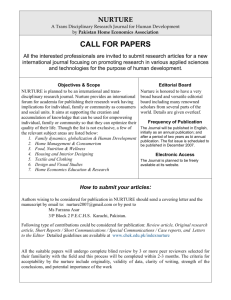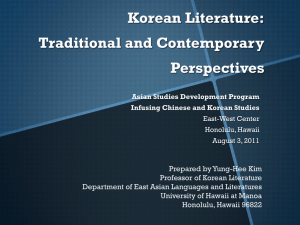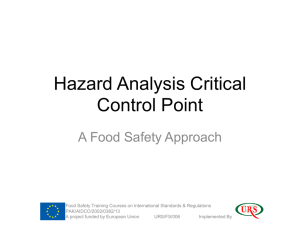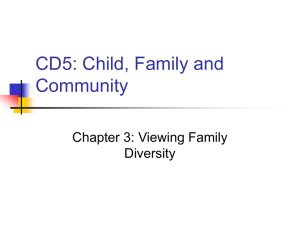Osama Siddique: Blasphemy Presentation
advertisement
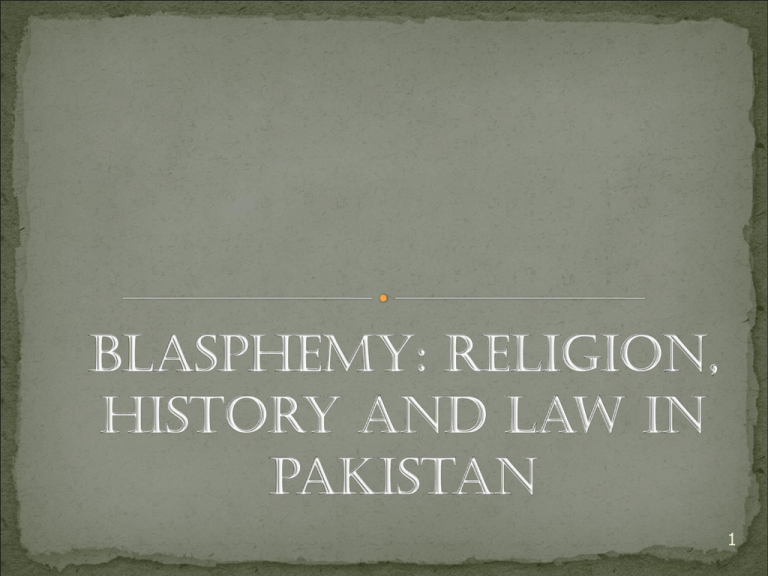
1 The Blasphemy Laws in Pakistan Islamization during the Zia Regime History; an illegitimate regime; Islam – a legitimizing device Origins of Chapter 15 of the Pakistan Penal Code • Introduction of the Indian Penal Code by the British in the sub-continent • Purpose behind the introduction of Chapter 15 Pre & post Zia versions From protecting all religions to protecting only Islam 2 Chapter 15 prior to the Zia regime included clauses: 295, 295-A, 296, 297 & 298 Clauses that were added during the Zia regime: 295-B: Defilement of the Holy Quran 295-C: Use of derogatory remarks in respect of the Holy Prophet 298-A: Use of derogatory remarks in respect of holy personages 298-B: Misuse of epithets, descriptions and titles reserved for certain holy personages or places 298-C: A person of the Qadiani group calling himself Muslim or preaching or propagating his faith [298- B & 298-C pertain specifically to Ahmedis/Qadianis] 3 “Whoever, with the deliberate intention of wounding the religious feelings of any person, utters any word or makes any sound in the hearing of that person or makes any gesture in the sight of that person, or places any object in the sight of that person, shall be punished with imprisonment of either description for a term which may extend to one year, or with fine, or with both.” 4 “Whoever, with deliberate and malicious intention of outraging the religious feelings of any class of His Majesty’s subjects, by words, either spoken or written, or by visible representations, insults or attempts to insult the religion or the religious beliefs of that class, shall be punished with imprisonment of either description for a term which may extend to two years, or with fine, or with both.” 5 “Use of derogatory remarks, etc; in respect of the Holy Prophet. Whoever by words, either spoken or written, or by visible representation, or by any imputation, innuendo, or insinuation, directly or indirectly, defiles the sacred name of the Holy Prophet Mohammed (peace be upon him) shall be punished with death, or imprisonment for life, and shall also be liable to fine.” 6 Requirement of Intent A vital pre-requisite in the pre Zia version Absence in the amendments introduced by Zia Judicial omissions to read intent into the blasphemy laws and the resultant injustices Lack of Definitional Specificity Wide ambit of clauses introduced by Zia Existence of textual ambiguity Comparative Perspective Laws on blasphemy either repealed or deemed nonfunctional in other jurisdictions Doctrine of Vagueness 7 Capital Punishment Federal Shariat Court judgment – Muhammad Ismail Qureshi v. Pakistan, PLD 10 (1991)(Pak.): Petition demanding that the alternative punishment of life imprisonment be declared void on account of repugnance to the Quran and the Sunnah, was accepted by the FSC and its demands endorsed on the basis of arguments employing the FSC’s interpretation of various Quranic verses. 8 Existing Issues with the Legal System Evidentiary Lacunae Court Incompetence Police Incompetence Vigilantism/Mala Fides Private Party Co-option Personal Vendetta Minorities 9 Evidentiary Lacunae Unreliable Witnesses Ayub Masih v. The State, PLD 1048 (2002)(Pak.) “The complainant and his companions came there [the location] by chance … the testimony of both of them neither inspires confidence nor can be termed as evidence having come from an unimpeachable source… the prosecution’s story does not ring true and the possibility of fabrication and false implication cannot be ruled out…”(1056-57) 10 Weak & Unsubstantiated Evidence Zahid Hussain v. The State, P Cr. LJ 1683 (2005)(Pak.) “Conviction recorded under 295-A … was recorded on the sole statement of the complainant, who made such a statement on the basis of spy information. No evidence whatsoever was produced by the prosecution to substantiate the charge that the appellants attempted to insult the religion or religious beliefs of any sect/class …” (1687) 11 Court Incompetence Neutrality of Judges Zahid Hussain v. The State, P Cr. LJ 1683 (2005)(Pak.) “ It [was] evidently clear that either the learned judge was completely ignorant of the law, or he was nursing malice against the appellants …” (1687) Procedural Violations Muhammad Yousaf v. The State, MLD 1339 (2006)(Pak.) “…the learned trial court put a query to the appellants after the closure of the proceedings…The Criminal Procedure Code, nowhere provides for such a course… trial court in such an eventuality was under obligation to stay its hands off in the matter.” (1341) 12 Police Incompetence Poor Quality of Investigation Saleem Masih v. The State, YLR 2422 (2003)(Pak.) “ … the investigation officer had hurried to complete the investigation within 24 hours, instead of making a serious effort to reach the truth.” (2424) Procedural Violations Muhammad Ashraf v. The State, MLD 1015 (2005)(Pak.) “As the FIR in the case has been lodged in violation of the mandatory provisions of section 196, Cr.P.C, therefore, the entire proceedings conducted up till now appear to be without legal authority …” (1016) 13 Total number of reported cases between 1960- 2007 104 67% of the total number of cases suffered from evidentiary lacunae and/or had an element of court or/and police incompetence. Evidentiary Lacunae 31 Court Incompetence 27 Police Incompetence Total 12 70 14 Vigilantism/Mala Fides Private Party Co-option Personal Vendetta Sardaran Bibi v. The State P Cr. LJ 342 (2007)(Pak.) “It is contended by the learned counsel that the petitioner is innocent and has been roped in this case by the complainant with mala fide intention.” (343) 15 Economic Rivalry/Property Dispute Ayub Masih v. The State, PLD 1048 (2002)(Pak.) “The credibility and credentials of the complainant are not above board and he is not an independent and truthful witness as the defense evidence on record indicates that he had a motive to falsely implicate the appellant. The motive was to grab an Ihata [piece of land] in possession of Inayat Masih, father of appellant.” (1058) [Supreme Court Verdict] 16 Political Rivalry Ranjha Masih v. The State, YLR 336 (2007)(Pak.) “… the assertion of the appellant that he had been framed in a false case only on account of political vendetta has appeared to me [the judge] to be an assertion which may not be without any substance or foundation.” (341) 17 Marital Disputes Zahoorul Haq v. Prof Javed Jiwan Mall P Cr. LJ 1049 (1987)(Pak.) “It is submitted that the compliant has been filed to harass the petitioner especially their sister and to pressurize her to get the custody of children…The object of these proceedings is obviously to harass the petitioners.” (1050) 18 Religious/Sectarian Differences Islam Khan v. The State P Cr. LJ 452 (1992)(Pak.) Zahoor Ahmed Abro v. The State, P Cr. LJ (1305)(Pak.) Qari Muhammad Younas v. The State, YLR 484 (2001)(Pak.) First two cases were against Qadianis while the third was against a Muslim. In the former case the counsel for the appellant stated that “… it is an admitted fact that the relations between the parties are not cordial due to their religious differences …” (453) 19 General Ill-will and Existence of Past Civil and Criminal Litigation Riaz Ahmed v. The State, PLD 485 (1994)(Pak.) Muhammad Anwar v. The State P Cr. LJ (1633)(Pak.) In the former case, some of the accused had appeared as prosecution witnesses in a complaint of trespass, criminal intimidation and mischief against the complainant, while in the latter the high court acknowledged that there existed some litigation between the petitioner and the others. 20 Total number of cases where an element of co-option and/or vendetta was alleged and/or considered by the Court 30 No. of cases where an element of co-option or vendetta was alleged 27 No. of cases where an element of vendetta or co-option was pointed out by the Court 3 No. of cases where the existence of co-option or vendetta was accepted by the Court 13 No. of cases where the existence of co-option or vendetta was rejected by the Court 3 Total % of reported cases that have findings of an element of co-option and/or vendetta 43 % 21 Implications for Minorities Constitutional Status of Minorities Christians Qadianis -Pak Const Article 2-A – [Islamic nature] “Whereas sovereignty over the entire universe belongs to Allah Almighty alone and authority which He has delegated to the State of Pakistan, through its people for being exercised within the limits prescribed by Him is a sacred trust.” - Pak. Const. Article 36 of “Protection of Minorities” “The State shall safeguard the legitimate rights and interests of minorities, including their due representation in the Federal and Provincial services” 22 - Pak Const. “ Islamic Way of Life” Art 227 (3): “Nothing … shall affect the personal laws of non-Muslim citizens or their status as citizens”. - The Second Amendment (wef. 17th September 1974) of 1973 Constitution declared Qadians or the Lahoris as non-Muslims. 298-B - (2) “Any person of the Qadiani group … by words, either spoken or written, or by visible representation, refers to the mode or form of call to prayers followed by his faith as ‘Azan’ or recites Azan as used by the Muslims, shall be punished with imprisonment of either description for a term which may extend to three years and shall also be liable to fine.” 298-C - Any person of the Quadiani group … who, directly or indirectly, poses himself as a Muslim, or calls, or refers to, his faith as Islam, or preaches or propagates his faith, or invites others to accept his faith, by words either spoken or written, or by visible representations or in any manner whatsoever outrages the religious feelings of Muslims, shall be punished with imprisonment of either description for a term which may extend to three years and shall also be liable to fine.” 23 Total number of reported cases between 1960- 2007 104 35% of the total number of reported cases were against minorities 65% of the total number of reported cases were against Muslims Absolute number of Muslims accused greater, but percentage of minorities accused disproportionately greater Total number of cases against Qadianis 28 Total number of cases against Christians 8 Total number of cases against Muslims 68 24
